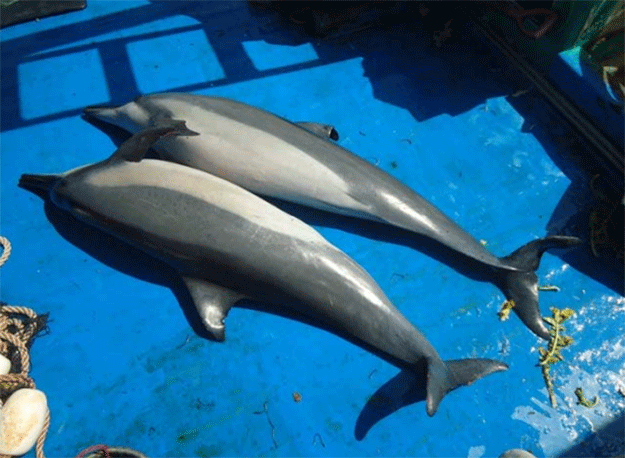
A recent study conducted by the World Wide Fund for Nature-Pakistan (WWF-P) and funded by the Australian Marine Mammal Centre, found that dolphins were frequently getting enmeshed in tuna gillnets due to Pakistan's fishing practices.
The study--'An Assessment of Cetacean Mortality in the Tuna Fisheries of Pakistan'--found that the use of tuna gillnets in fishing practice was marred with high bycatch of dolphins, turtles and other cateceans; due to operations which are non compliant to United Nations General Assembly (UNGA) regulations which prohibit the use of large scale driftnets on high seas.

PHOTO: WWF-PAKISTAN
Tuna fishing in Pakistan is based on large scale gillnets which increases the interaction between dolphins and the gillnet. Between Iran and Pakistan, it is estimated that there are more than 7,000 operational gillnets.
With approximately 500 vessels dedicated to catching tuna along the coast, the length of the gillnet was observed to be longer than 2.5 kilometres -- much higher than the average -- and large scale gillnetting is more harmful to non-target species especially cetaceans.

PHOTO: WWF-PAKISTAN
Although it has proven difficult to ascertain the number of dolphins killed each year, it has been estimated that between 25 and 35 dolphins are killed every month in such operations and on average one to four dolphins are entangled in each fishing trip.
Read: Protecting Karachi's coastal habitat
A higher rate of dolphin morality was found along the coast of Sindh, while fewer were recorded along the Balochistan coast. In almost all cases, dolphins entangled in the tuna gillnet operations die and are later discarded.

PHOTO: WWF-PAKISTAN
With a large number of the species unidentifiable by Pakistani fishermen, WWF have offered to prepare a Species Identification Guide for dolphins in order to guide stakeholders including observers, samplers and fishers to improve the recording and reporting of each cetacean bycatch.
After a year-long observation of the operations and the affects on the different species of dolphins in Pakistan, the entanglement of some threatened and protected species including dolphins and whales, brings into question whether the increasing use of large gillnets should be a point of concern for fisheries scientists and managers.

















COMMENTS (2)
Comments are moderated and generally will be posted if they are on-topic and not abusive.
For more information, please see our Comments FAQ